The mineral wealth of Milos
Modern production activity
The main minerals that are mined on Milos today are bentonite, perlite, pozzolan, siliceous stones, kaolin and small quantities of baryte.
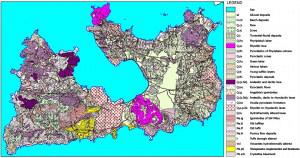 The geological map of Milos |
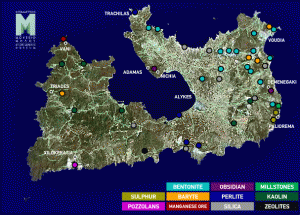 Mining locations of the products (historical & modern) |
Bentonite
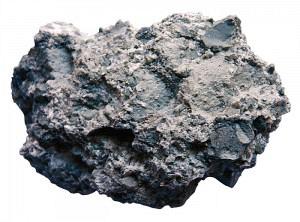
Bentonite is a plastic clay, generated from the in situ alteration of volcanic ash. Bentonite is widely used thanks to its characteristic properties, such as:
- high absorption capacity
- high plasticity
- ion-exchange potential
- Thixotropy in viscous suspensions
- it can act as binding material
Main uses of bentonite
|
|
| Markets/Segments | Main End-Uses |
| Foundry | Binder for green sand |
| Iron and steel making | Binder for the production of iron-ore pellets |
| Environmental protection, construction projects | Thixotropic additive for foundation engineering, diaphragm wall construction, grouting and tunneling |
| Component of soil sealants | |
| Oil drilling | Thixotropic additive for the production of drilling mud |
| Absorbents | Pet-litter |
| Paper Industry | Additive in paper manufacturing, de-inking of recycled pulp and autographic papers |
| Other special applications | Additive in detergents, desiccants, waste water treatment, wine purification |
“Environmental” uses of bentonite
|
|
| Markets/Segments | Main End-Uses |
| Sealing of municipal waste landfills | Since bentonite is impermeable to water, the possibility for the aquifer to be contaminated by the pollution load of the waste is minimized. At the same time, because of its swelling property, cracks are filled, and, as a result, the construction becomes more water impermeable. Bentonite is also used to reinforce the peripheral (perpendicular) diaphragm wall constructions; as an additive in foundations, controlling the influx of water into tunnels and other technical works. |
| Burial of radioactive waste | Radioactive waste is stored in steel containers and buried underground. Because of its plasticity, bentonite forms a protective casing around these containers, preventing the transmission of high pressures from the surrounding rocks to the radioactive waste containers, while, in parallel, it ensures strong adhesion to the host rock, with a capacity to self-cure following tectonic disturbances. Moreover, the low permeability and ion-exchange capacity of bentonite minimizes diffusion of radioactive elements into the environment. |
| Environmental protection, construction projects | Thixotropic additive for foundation engineering, diaphragm wall construction, grouting and tunneling |
| Processing of waters and industrial waste | Due to its absorbing capacity, bentonite is used in the processing of effluents from metal plating, paper, pharmaceuticals, paint and textile industries, to absorb heavy metals and/or organic pollutants. |
| Agricultural applications | The addition of bentonite to poor soil enhances its composition, while at the same time it provides increased water retention, therefore contributing to the best utilization of this valuable and scarce commodity. In addition, when used as a pesticide-carrier, it contributes in the reduction of the content of active ingredients, thus helping to protect the aquifer. |
Perlite
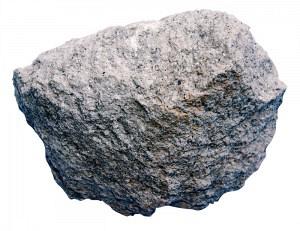 Perlite is a natural volcanic glass, formed by the sudden cooling and solidification of volcanic ash, which traps water into its mass. Perlite’s most important natural property which is its ability to expand in temperatures of 800o–950o C, is precisely due to the existence of the entrapped water in its interior.
Perlite is a natural volcanic glass, formed by the sudden cooling and solidification of volcanic ash, which traps water into its mass. Perlite’s most important natural property which is its ability to expand in temperatures of 800o–950o C, is precisely due to the existence of the entrapped water in its interior.
The abrupt, controlled rise of temperature causes a white mass of minuscule glass bubbles to be formed. Perlite melts and expands due to the entrapped water’s evaporation. The mineral thus acquires special properties as heat and sound insulation material, whereas at the same time it becomes extremely porous.
Main uses of perlite
|
|
| Markets/Segments | Main End-Uses |
| Formed building products | Acoustical ceiling tiles, roofing tiles, boards & panels |
| Bulk Building materials | Plasters, mortars, light weight aggregates for roofs and under layments and loose-fill insulation |
| Horticulture | Growing medium for greenhouse cultivation and soil mixes, substrates |
| Filtration | Filter aids for the production of juices, beverages, edible oils, chemical, pharmaceutical, and petroleum products |
| Industrial applications | Cryogenic insulation, pipeline insulations for industrial gases, heat-resistant applications for foundries |
| Chemical industries | Raw material for the pozzolanic cement, silica source |
“Environmental” uses of perlite
|
|
| Markets/Segments | Main End-Uses |
| Agricultural applications | Expanded perlite is used as substrate in hydroponics and as an ingredient in mixtures, mainly with turf, to create the right substrate for foliated and floriferous plants growing in pots. Perlite is very successful in these applications, because it combines multiple properties: it provides the rhizosphere with the ideal air-water ratio throughout the year and it presents the most ideal air – water ratio. Perlite constitutes a uniform growth medium, increasing root density and facilitating uniform distribution in the substrate. |
| Filter-enhancing agents – Liquid filtration | Expanded perlite is a cost-effective agent for liquid filtration, characterized by high porosity, chemical purity, stability and non reactivity. Perlite does not alter the chemical composition of the liquid filtered, scavenging only any solid foreign substances contained in it, through a natural separation process, contributing to a high process productivity and resulting in sufficient purity of the end product. Perlite is mainly used for the filtration of wines, sugar and starch, edible oils, water, as well as in other chemical and pharmaceutical industries. |
Pozzolans
Pozzolans are volcanic earths (tuffs), usually of trachitic – andesitic origin and have been used in hydraulic mortars since Roman times and possibly even before. Pozzolans are used today in the cement industry around the world, while in Greece they exist in large quantities on Kimolos, Milos, Aspronissi, Yali, Thera and Therassia.
Their most important use is in the production of pozzolan containing cement (up to 20%), or pozzolanic cements (20 – 48%), according to Greek specifications.
Siliceous stones
 Siliceous stones include a great number of minerals. Silicon is present in their structure in a quadruple combination with the oxygen. It is estimated that 95% of the earth’s crust consists of siliceous and aluminosilicate minera
Siliceous stones include a great number of minerals. Silicon is present in their structure in a quadruple combination with the oxygen. It is estimated that 95% of the earth’s crust consists of siliceous and aluminosilicate minera
The siliceous material of Milos is microcrystalline quartz of the type a-quartz (maximum grain size 10μm) and derives from the hydrothermic change of the original volcanic rock.
The Micro-crystal siliceous material of Milos is used in glass-making, ceramics (tiles, tile adhesives, ceramic masses), in the construction industry (plasters, decorative tiles), in colour industry, as foundry sand, in water-glass production, in the refractory materials industry and the cement industry.
Kaolin
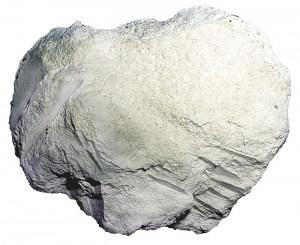 Kaolin is a mixture of hydrous aluminium silisic oxides and it includes the minerals kaolinite, anoxite, halloysite and allophane. These minerals have the same chemical composition, but different optical properties and a different internal structure of their crystals, as shown under x-ray examination. In Greece, on certain Aegean islands such as Milos, Lesbos and Kimolos, we find kaolin suitable for paper and cement industries.
Kaolin is a mixture of hydrous aluminium silisic oxides and it includes the minerals kaolinite, anoxite, halloysite and allophane. These minerals have the same chemical composition, but different optical properties and a different internal structure of their crystals, as shown under x-ray examination. In Greece, on certain Aegean islands such as Milos, Lesbos and Kimolos, we find kaolin suitable for paper and cement industries.
Baryte
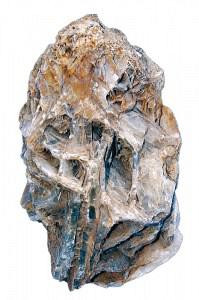 Baryte is a heavy, inert and stable mineral. These properties make it useful in a number of industrial and technical applications. Approximately, 80% of baryte produced, is used for the preparation of drilling pulps especially for oil wells. Addition of baryte increases the special gravity of these pulps. Other uses, such as glass-making, elastics, paper and chemical industries, absorb lesser quantities of baryte. “Barytine” in Greece, is the name given to baryte, with a low content of silver. It is found on the islands of Mykonos, Milos, Kimolos, Polyegos. Baryte ores of a lesser importance can be found in the Peloponnese, in Macedonia (Kilkis) and on the island of Thasos.
Baryte is a heavy, inert and stable mineral. These properties make it useful in a number of industrial and technical applications. Approximately, 80% of baryte produced, is used for the preparation of drilling pulps especially for oil wells. Addition of baryte increases the special gravity of these pulps. Other uses, such as glass-making, elastics, paper and chemical industries, absorb lesser quantities of baryte. “Barytine” in Greece, is the name given to baryte, with a low content of silver. It is found on the islands of Mykonos, Milos, Kimolos, Polyegos. Baryte ores of a lesser importance can be found in the Peloponnese, in Macedonia (Kilkis) and on the island of Thasos.
Bentonite
